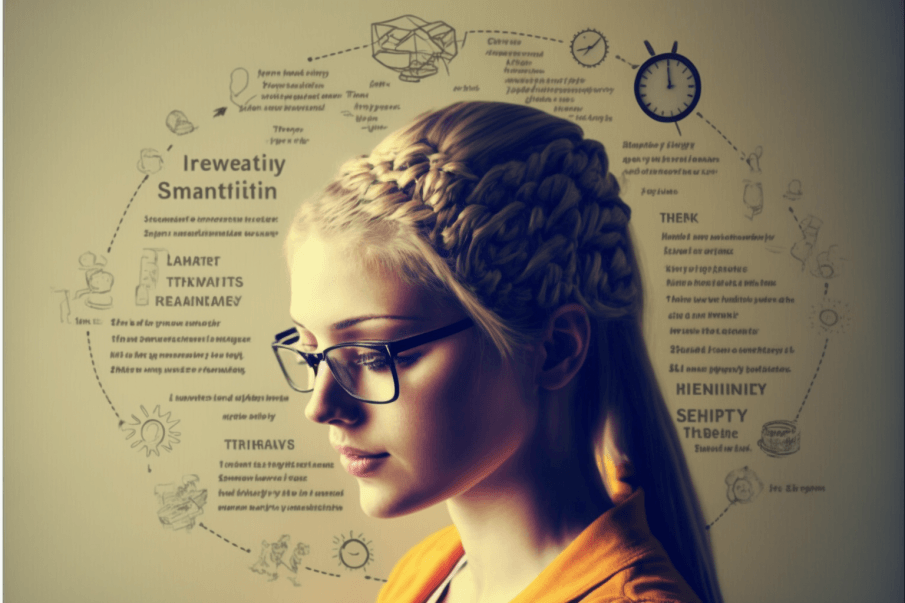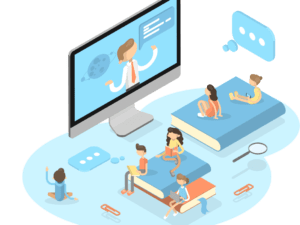👨🎓 Learn how to Learn, Study smart not hard ⏲ Time Management Effective 🎯 Goal setting, prioritization 5 study strategies
- Description
- Curriculum
- Reviews

In this comprehensive study skills course, you’ll learn how to learn everything you need to know and how to study effectively and efficiently. Whether you’re a student in high school, college, or beyond, you’ll discover powerful strategies and techniques for getting better grades and maximizing your learning potential. Gone are the days of spending countless hours studying, only to struggle with retaining the information.
🔤 Text: English + Translation in other languages
🎧 Audio-Video: English with subtitles in other languages
This course will teach you how to study smarter, not harder, so you can make the most of your time and achieve your academic goals. You’ll learn about effective time management, powerful note-taking techniques, and memory-enhancing strategies.
You’ll also discover how to read textbooks more efficiently, prepare for tests with confidence, and overcome distractions and procrastination. You’ll even learn how to set goals, stay motivated, and celebrate your progress along the way. Throughout this course, you will learn various techniques and strategies to help you manage your time more effectively, make better decisions, set and achieve your goals, prioritize tasks, and focus and concentrate on your studies. With practice and dedication, you will be able to apply these concepts to your own life and see improvement in your academic and personal pursuits. Remember to be patient with yourself as you begin to implement these strategies and don’t hesitate to reach out for support if you need it.
Learn how to Learn: Time Management
Time Management and Decision-Making are essential for students, professionals, and anyone looking to improve the quality of their lives. With the information and strategies provided in this course, you will be able to better manage your time, set and achieve your goals, and make better decisions. By the end of this course, you should have a better understanding of how to manage your time and study effectively, and you should be able to apply these skills to achieve your academic goals.
Course outline
In this course, we will cover various topics, including time management and study skills, decision-making frameworks, goal-setting, prioritization and task management, focus and concentration, and study strategies. Each topic will include tips and tricks to help you apply the concepts to your own life.
⏲ Time Management and Decision Making
We will be delving into the topic of time management and decision-making. These are essential skills that are crucial for achieving success in both personal and professional life. We will be covering various topics including setting and achieving goals, prioritizing and managing tasks, planning, organization, and decision-making frameworks. We will provide students with practical tips and strategies for managing their time more effectively and making better decisions. Additionally, we will discuss the importance of focus and concentration, and provide strategies for overcoming procrastination.
🎯 Goal Setting
We will be focusing on the process of setting and achieving goals. Setting goals is an essential step in achieving success, as it gives direction and purpose to our actions. We will cover the importance of setting goals and the benefits of having a clear plan in place. Additionally, we will discuss the SMART or SMARTER methodology, which is a tool that can be used to set and achieve goals. We will also explore strategies for overcoming learned helplessness and developing self-discipline. This section of the course will cover techniques for creating good habits, developing self-discipline, and creating systems, rather than just goals.
📈 Prioritization & To-Do List
How to identify and prioritize tasks, manage a to-do list, focus on the most important task and avoid distractions, which will lead to better performance and productivity. By applying the strategies discussed in this section, students will be able to manage their time effectively and achieve their goals in a more efficient way.
🕵️♂️ Focus & Concentration and Procrastination
How to improve focus and concentration, and overcome procrastination. By applying the strategies and techniques provided in this section, students will be better equipped to manage their time effectively, achieve their goals and improve their performance in both academic and personal pursuits.
📅 Planning and Organization
How to effectively plan and organize time, which will lead to greater productivity and success in academic and personal lives. By applying the strategies and techniques discussed in this section, students will be able to balance their responsibilities, manage stress and avoid burnout, and achieve their goals in a more efficient way.
👨🎓 Study Strategies – 🧠 Mind Map – Exams & Test Anxiety
We will delve into study strategies and test-taking. We will cover how to learn effectively, the science of memory, and six effective note-taking techniques. We will also discuss how to manage test anxiety and prepare for exams.
📝 Writing Papers & Essays – 🧘♀️ Doing physical activity
This section of the course will provide students with the tools and strategies they need to write effective papers and essays, revise and edit their work, and incorporate physical activity into their daily lives to improve academic performance. By following the tips and strategies provided in this section, students will be better equipped to manage their time and achieve success in their academic pursuits.
👉 Join our Discord Server to ask questions, share progress and learn & engage with others
-
1🟢👉 SKS Online Course guide, tips, and emojis meaning list
Start from here, with our online course guide, tips, and emojis meaning list
-
2👨🎓🤝🎧🎓💡 🎨 Learning how to learn
In this lesson, we will be discussing tips and strategies for effective learning, as well as exploring various activities related to the topic. Learning how to learn is a skill that will benefit you throughout your entire life. It's not just about getting good grades in school, but about being able to acquire new knowledge and skills efficiently and effectively.
-
3🆕👨🎓🤝🎧🔑 How Memory works
Human memory is a complex and fascinating system that enables us to process, store, and retrieve information. Understanding how memory works is essential for students as it helps in creating effective studying strategies, preventing forgetfulness, and understanding the causes of memory disorders. In this lesson, we will explore the different parts of the memory system, and how they work together to store and recall information.
https://youtu.be/SZbdK9e9bxs?t=35
-
4🆕👨🎓🤝🎧💡 Effective Study Techniques: Study Less, Study Smart
In this lesson, we will discuss effective study techniques based on Professor Dr. Marty Lobdell's video "Study Less, Study Smart". The video is an hour-long lecture on how to be an effective student, but we will condense it to the most important tips to save you time.
-
5🆕👨🎓🤝🎧💡 What do top students do differently? Mindset, routine, taking notes
Academic success is not just about intelligence and hard work. Top students have habits, strategies, and mindsets that set them apart. By cultivating a growth mindset, having a study routine, taking effective notes, and having a positive attitude, you can improve your study skills and achieve your academic goals. Remember, success is a journey, not a destination, and every step forward counts. Good luck!
-
6👨🎓🤝🎓🤦♂️🎧💡🔑 Growth Mindset vs Fixed Mindset: The importance of Trust and Learning from Mistakes in STEM or for Career Success
Welcome to this lesson on the importance of trust, a growth mindset, and learning from mistakes in STEM and in everyday life. These three concepts are essential for building strong, healthy relationships and fostering personal and professional growth. In this lesson, we will explore what each of these concepts means and how they can be applied in our daily lives. We will also provide ideas and activities that you can use to help foster trust, a growth mindset, and a culture of learning from mistakes in your own life and with others.
-
7🆕👨🎓🤝🎧🎓🤷♂️💡 6 Effective Note-taking techniques to learning and retaining information.
Effective note-taking is a valuable skill that can help students and professionals retain information, organize thoughts, and prepare for exams and presentations. There are several note-taking techniques that can be used depending on the type of information being presented, the learning style of the individual, and the purpose of the notes. These techniques include the Cornell Method, the Outlining Method, the Mapping Method, the Charting Method, the Sentence Method, and the Abbreviation Method. It is important to experiment with different techniques and find the one that works best for you. Additionally, it is important to review and revise your notes regularly to consolidate learning and retention.
-
8🆕👨🎓🤝🎧 Effective reading techniques
Effective reading is a set of skills and strategies that can help individuals improve their reading comprehension, retention, and overall efficiency when reading. It involves breaking down the reading process into several stages, including pre-reading, active reading, and post-reading, and using specific techniques to improve understanding and retention.
-
9🆕👨🎓🤝🎧 How to Read Faster and More Efficiently
Reading faster and more efficiently can greatly improve your academic performance and save you valuable time. However, it is important to note that speed reading techniques, such as those that claim to increase the reading speed to 1000 words per minute or more, are not scientifically proven and can actually harm comprehension. Instead, we will focus on strategies that will help you read more efficiently and increase your reading speed without sacrificing comprehension.
-
10🆕👨🎓🤝🎧 Do you actually need to do all the reading assigned to you in your classes?
Some classes may have a lot of overlap between the textbook readings and the lectures, while others may require more in-depth readings. To determine what readings to do, we suggest using the framework provided by Cal Newport's book "How to Become a Straight-A Student." He divides assigned readings into two groups: assignments from the class's favored source, usually the main textbook, and supplemental readings.
-
11🆕👨🎓🤝🎧 Strategies for tackling large reading School/College assignments
In this lesson, we discuss strategies for tackling large reading assignments in college or at school. The first step is to understand why you are doing the reading. In addition to learning the material, the primary reason for reading is to prepare for the assessments that will be given in class. By understanding the type of assessment that will be given, you can determine what type of information you need to pull from your readings.
-
12🆕👨🎓🤝🎧🎫🎓🤷♂️💡 Best strategies to practice active recall and how to create flashcards
Active recall is a powerful study technique that can help learners to improve their memory retention and recall of information. The strategy involves actively trying to retrieve information from memory rather than passively reviewing it. The active recall involves actively trying to retrieve information from memory, rather than passively reviewing it. There are many different ways to practice active recall, and in this lesson, we will discuss different ways to practice active recall in a few minutes.
-
13🆕👨🎓🤝📝🎧 Reflective journals a powerful tool for self-reflection, personal growth and critical thinking
Reflective journals are a powerful tool for self-reflection and personal growth. They can be used to explore personal assumptions, beliefs, and values, as well as to track personal growth and progress over time. In this lesson, we will discuss what reflective journals are, how to use them, and the benefits of incorporating them into your personal and professional development.
-
14👾💡👉 Join our Open Discord Server to share your progress, engage with other and peer review your activities
Join us on our open server to share your progress and ask questions, engage and have fun with others and receive feedback. On the server, there are specific channels for each topic, where you can share your content and read what other members and course authors have posted. This is a great way to connect with others with the same passions and learn from each other's experiences and insights.
-
15🆕⏲👨🎓🎧🎓💡 Effective time management and study skills for success
In this lesson, we will be exploring the concept of time management and study skills and the importance of these skills for academic success. We will discuss the definitions of time management and study skills and provide tips and strategies for improving these skills. We will also explore a variety of related topics, such as goal setting, prioritization, and managing time and priorities in your studies.
-
16🆕⏲👨🎓🎧💡 Benefits of Using a Decision-Making Framework for Time Management
Using a decision-making framework can be a valuable tool for improving your time management skills. By clarifying your goals, increasing efficiency, reducing stress, and enhancing your problem-solving skills, a decision-making framework can help you to make better decisions about how to allocate your time and resources.
-
17🆕🧠💡🎧🎓🤷♂️ Six Thinking Hats method and SWOT analysis
This lesson will introduce students to the Six Thinking Hats method and the SWOT analysis, two decision-making tools that can help to create a more balanced and comprehensive approach to decision-making. Through practice and exploration, students will learn how to apply these tools to real-life problems and situations, and reflect on how emotions and biases may impact decision-making. Educators will have a list of activities that can be used in class to enhance the learning experience through teamwork and role-playing. All these activities and tools require critical thinking, problem-solving, and decision-making.
-
18🆕⏲👨🎓🎧💡 Time management strategies for studying and tips
Effective time management is crucial for success in any area of life, and studying is no exception. By developing a set of strategies for managing your time effectively, you can make the most of your study sessions, minimize distractions, and improve your productivity. In this lesson, we will cover several key strategies for managing your time while studying, including setting goals, creating a schedule, eliminating distractions, and more.
-
19⏲👨🎓🎧💡 The Pareto principle, also known as the 80/20 rule
The Pareto principle, also known as the 80/20 rule, is a principle that states that roughly 80% of effects come from 20% of the causes. It is named after economist Vilfredo Pareto, who observed that roughly 80% of the land in Italy was owned by 20% of the population.
-
20⏲👨🎓🎧🎓🤷♂️💡 Time management: the 🍅 Pomodoro Technique
Welcome to this lesson on the Pomodoro Technique, a time management method that helps individuals improve their work and study habits by breaking down tasks into intervals of focused work followed by short breaks. Pomodoro Technique is named after the Italian word for 'tomato,' after the tomato-shaped kitchen timer that Cirillo used to track his work. In this lesson, we will discuss the six steps of the Pomodoro Technique and the benefits of using this method to increase productivity and improve the quality of work. We will also provide ideas and activities for incorporating the Pomodoro Technique into your daily routine and achieving your goals. Whether you are a student looking to improve your study habits or a professional looking to boost your productivity, the Pomodoro Technique can help you to better manage your time and stay focused on your tasks.
-
21🆕🎯👨🎓🎧🎓💡 Setting goals and creating a plan for success
With the right strategy and support, students can set goals and create a plan for success that will help them achieve their career aspirations. It is important to remember that goal-setting and career planning is an ongoing processes and that it is normal to adjust your goals and plans as you learn more about yourself and the world of work. With clear goals, a well-defined plan, and the support of others, students can set themselves up for success in their future careers.
-
22🆕🎯👨🎓🎧💡 Importance of setting goals
In this lesson, we will be discussing the benefits of setting goals and the role they play in achieving success. Goal setting is the process of identifying specific targets that you aim to achieve. These goals can be short-term, such as completing a project by a certain deadline, or long-term, such as earning a degree or achieving a certain career position. Setting goals is important because it gives you direction and focus, and helps you to stay motivated and on track.
-
23🎯👨🎓🎧🧘♀️💡 From Passive to Proactive: How to Overcome Learned Helplessness and Achieve Your Goals
Moving from a passive to a proactive mindset can help you to overcome learned helplessness and achieve your goals. To do this, focus on the process, embrace challenges, learn from mistakes, seek feedback, and practice gratitude. By developing a growth mindset, you can transform your approach to challenges and setbacks and increase your chances of success.
-
24🎯👨🎓🎧🤝💡 The SMART or SMARTER methodology is a tool that can be used to set and achieve goals
In this lesson, we will discuss a tool that can be used to set and achieve goals in a more effective and efficient manner. The S.M.A.R.T. acronym stands for Specific, Measurable, Attainable, Relevant, and Time-bound, and following these guidelines can help to ensure that your goals are clear, achievable, and motivating.
-
25🎯👨🎓🎧🧘♀️🎓🔗🔑🔬🎨🧰💡 How to create good Habits and Self-Discipline for Students. Set systems rather than goals
Developing good habits and discipline is crucial for students as it helps them to establish routines, become more responsible, and improve their academic performance. However, creating good habits and discipline can be challenging, especially with distractions and conflicting priorities. In this lesson, we will discuss strategies to assist students in developing good habits and discipline, and the benefits of doing so. Good habits and discipline can help students become more organized, focused, motivated, and able to make better decisions and take on more responsibilities. We will provide ideas and activities, including STEM Education and STEAM activities, to help students practice and reinforce these skills. By understanding and implementing good habits and discipline, students can set themselves up for success in school and in life.
-
26🆕📈👨🎓🎓🤷♂️💡🎧 Identifying and prioritizing tasks: urgent vs important Eisenhower Matrix
In this lesson, we will be discussing the importance of identifying and prioritizing tasks in order to manage your time and resources effectively. By learning how to prioritize tasks, you can increase your productivity, achieve your goals, and reduce stress. In this lesson, we will cover strategies for identifying and prioritizing important tasks, including setting clear goals, breaking tasks down
-
27🆕📈👨🎓🎓🤷♂️💡🎧 DDDD Strategies: Do Delay Delegate Delete
The DDADD method is a time management technique that helps individuals prioritize tasks and make the most of their time. By following the steps of the DDADD method, learners can focus their time and energy on the tasks that are most important and make the most of their day.
-
28🆕📈👨🎓💻🎧💡 TO-DO List & app, and how to Manage Too Many Tasks
A to-do list is a list of tasks or actions that you need to complete, either in the short term or the long term. To-do lists can be useful for a variety of purposes, including organizing your workload, setting priorities, and helping you stay on track with your goals.
-
29🆕🕵️♂️👨🎓🎧🎓🤷♂️💡 Focus & Concentration and STOP multitasking!
Focus and concentration are essential skills for academic success. In this lesson, we will discuss the importance of focus and concentration, provide examples of how to improve focus and concentration, and offer advice on how to make the most of these skills.
-
30🆕🕵️♂️👨🎓💡 Dealing with distractions and unexpected interruptions
In this lesson, we will be discussing the importance of minimizing distractions and handling unexpected interruptions in order to increase productivity and stay focused on your tasks. Distractions and unexpected interruptions can come in many forms, such as phone calls, emails, notifications, and unexpected visitors. These distractions can disrupt your workflow, decrease your productivity, and make it difficult to achieve your goals.
-
31🆕🕵️♂️👨🎓🎧🎓🤷♂️💡 Procrastination, what causes it, and how to overcome it
Procrastination is a common problem that many people struggle with, and it can be a major obstacle to achieving success in school and in life. In this lesson, we'll take a closer look at procrastination, what causes it, and how to overcome it.
-
32🆕📅👨🎓🎧🎓🤷♂️💡 Planning
This lesson focuses on the importance of planning and organization in the learning process. Students will learn the strategies to develop these skills, including creating a schedule, setting goals, having a dedicated study space, keeping track of assignments and deadlines, and regularly reviewing their plans. Through the activities and tasks, students will be able to improve their study habits and be well on their way to success.
-
33🆕📅👨🎓🎧 Creating a schedule and using a planner
Creating a schedule and using a planner are two important tools for effective time management and organization. In this lesson, we will discuss the importance of creating a schedule and using a planner, provide examples of how to create a schedule and use a planner, and offer advice on how to make the most of these tools.
-
34🆕📅👨🎓🎧 Balancing academic and personal responsibilities
Balancing academic and personal responsibilities is an essential skill for students to master. In this lesson, we will discuss the importance of balancing academic and personal responsibilities, provide examples of how to balance these responsibilities, and offer advice on how to make the most of these skills.
-
35🆕📅👨🎓🎧💡 Tips for managing stress and avoiding burnout
Stress and burnout are common issues that many people face in their daily lives, whether it's due to work, personal relationships, or other factors. Managing stress and avoiding burnout are important for maintaining your physical and mental well-being, and can help you be more productive and efficient in your personal and professional life.
-
36🆕🧠💡🎧💻 MindMeister Tutorial: Learn how to create mind maps and use them to organize and visualize information.
Mind mapping is a powerful tool that can help learners to organize and visualize information. A mind map is a diagram that uses a central idea or concept and branches out to show how different ideas or concepts are related. By creating a mind map, learners can see the connections between different pieces of information, making it easier to understand and remember. In this lesson, we will discuss how to create a mind map and use it to organize and visualize information.
-
37👨🎓🤝🎧🎓🤷♂️💡 Connecting the dots, learning by making connections between different pieces of information
In this lesson, we will explore the concept of connecting the dots as a powerful approach to learning. We will discuss the benefits of this approach, as well as some key strategies you can use to facilitate learning by connecting the dots.
-
38🆕👨🎓🤝🎧🎓🤷♂️💡 Studying for Exams
Studying for exams is a crucial part of the academic experience, and it's important to approach it in an organized and strategic way to achieve the best results. In this lesson, we will discuss effective ways to study for exams, including how to create a study schedule, how to review and retain information, and how to prepare for different types of exams.
-
39⭐👨🎓🤝🎧🎓🤷♂️💡 Effective study strategies and tips for different types of exams
Effective study strategies can vary depending on the type of exam you will be taking. In this lesson, we will discuss several different strategies for different types of exams, including multiple-choice, short-answer, and essay exams.
-
40🆕👨🎓🤝🎧 Understanding the causes of Test Anxiety
Test anxiety is a common problem that many students face, and it can be a major obstacle to achieving success in school. In this lesson, we'll take a closer look at test anxiety, what causes it, and how to manage it.
-
41🆕👨🎓📝🎧💡 Tips for planning, organizing, and writing papers and essays
The process of writing a paper or essay can seem daunting at first, but it's important to remember that it's just a series of small steps that, when taken together, will lead to a completed piece of work. In this lesson, we'll go through the process of writing a paper or essay step by step, and cover some tips and tricks to help you along the way.
-
42🆕👨🎓📝🎧💡 Strategies for revising and editing
Revising and editing are important steps in the writing process. Revising involves making big changes to the structure and content of your paper, such as reworking your thesis or adding or deleting sections. Editing, on the other hand, is the process of correcting any spelling, grammar, or punctuation mistakes. Together, they will help you to improve the overall quality and clarity of your writing. In this lesson, we will explore various strategies for revising and editing your work.
-
43🆕👨🎓🧘♀️🎧 Importance of physical activity for academic success
In this lesson, we discuss the importance of exercise in relation to studying and overall cognitive function. Research has shown that regular physical activity can improve memory, concentration, and overall cognitive performance. The first way that exercise can help with studying is by increasing blood flow to the brain. During physical activity, the heart pumps faster, which in turn increases blood flow to the brain. This increased blood flow provides the brain with more oxygen and nutrients, which can help improve cognitive function and memory.

















